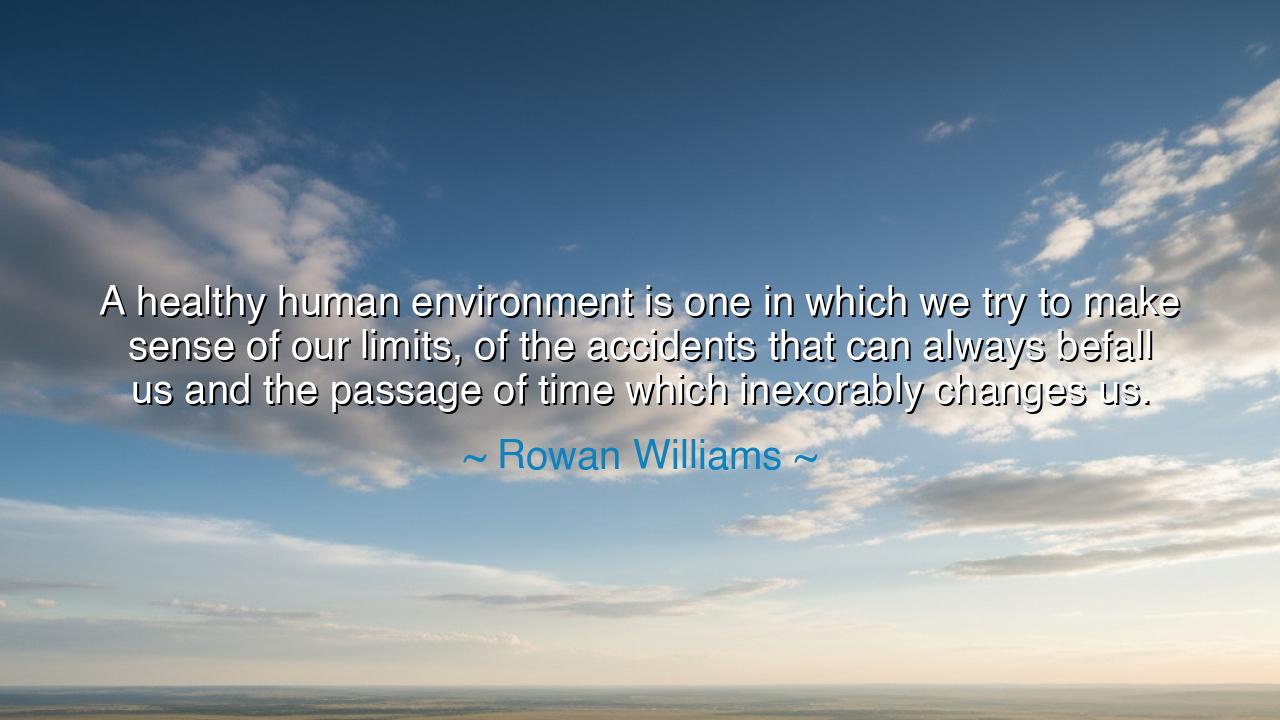
A healthy human environment is one in which we try to make sense
A healthy human environment is one in which we try to make sense of our limits, of the accidents that can always befall us and the passage of time which inexorably changes us.






“A healthy human environment is one in which we try to make sense of our limits, of the accidents that can always befall us and the passage of time which inexorably changes us.” Thus spoke Rowan Williams, a thinker of deep spirit and tempered wisdom. His words are not merely an observation — they are a call to awaken the soul to the truth of existence. For we, children of the earth, live not as gods untouched by frailty, but as beings bound by limits, shaped by accidents, and carried ever onward by time. To deny these is to live in illusion; to accept them is to enter the sacred rhythm of being human.
In the age of the ancients, such understanding was the very foundation of wisdom. The Delphic temple bore the inscription “Know thyself,” for to know oneself was to know one’s limits — to perceive that strength and weakness are twin threads in the same fabric. The old philosophers and poets did not seek to escape mortality, but to dance with it. They knew that time was not an enemy but a sculptor, shaping the rough stone of our lives into form. And they knew that accidents, the unforeseen turns of fate, are not curses but the test of our inner mettle — the forge wherein the spirit is tempered.
Consider the story of Nelson Mandela, who was imprisoned for twenty-seven years in the cold stone belly of Robben Island. Many men would have broken under such confinement, consumed by bitterness or despair. Yet Mandela accepted his limits — the bars, the isolation, the slow erosion of time — and made meaning within them. He turned the accident of his imprisonment into a crucible of wisdom, so that when freedom at last came, he bore not vengeance but peace. His life became a living parable of Rowan Williams’ truth: that a healthy environment is not one free of hardship, but one where the soul learns to make sense of hardship, and through that, to grow.
For to live is to suffer change. The body ages, friendships drift like leaves upon the current, ambitions rise and fall. The passage of time humbles all pride and teaches patience to the restless heart. But this transformation need not be feared. Like the turning of the seasons, it is both loss and renewal — a reminder that each ending hides the seed of beginning. The wise do not resist time; they listen to its lessons, learning that beauty dwells as much in decline as in ascent.
And what of accidents, those sudden upheavals that shatter our careful plans? They are the thunder that wakes us from sleep. A sickness, a betrayal, a loss — these come unbidden, as storms across the sky. Yet from them arises compassion, the understanding that we are all equally vulnerable beneath the heavens. In learning to face accidents with courage rather than resentment, we build a world gentler and more human. The healthy soul does not demand control; it seeks meaning even in chaos.
To make peace with our limits is not defeat — it is liberation. When we cease to flee from imperfection, we discover a deeper harmony. The tree grows stronger not by denying the wind, but by bending with it. The river carves its path not by force, but by yielding. So too must we, in our families, our work, our nations, learn the art of acceptance. Only then can we build an environment that nurtures rather than devours, that heals rather than hardens.
So, dear listener, the teaching is clear: do not rage against the flow of life, but learn from its turning. Embrace your limits, for they reveal your humanity. Accept the accidents that come, for they teach resilience. Honor time, for it alone grants depth to your days. In doing so, you will dwell in a truly healthy human environment — one where wisdom breathes, compassion grows, and peace abides.
Practical actions for the seeker: Each morning, take a moment to name your limits, not as burdens but as guides. When misfortune visits, ask not “Why me?” but “What may this teach me?” Mark the passage of time with gratitude — reflect on what has changed in you and what endures. Speak gently to yourself and to others, knowing that all walk the same fragile path. And when you find meaning in your limits, courage in your accidents, and grace in your passing years, then you will have touched the heart of Rowan Williams’ wisdom — and the heart of life itself.






AAdministratorAdministrator
Welcome, honored guests. Please leave a comment, we will respond soon